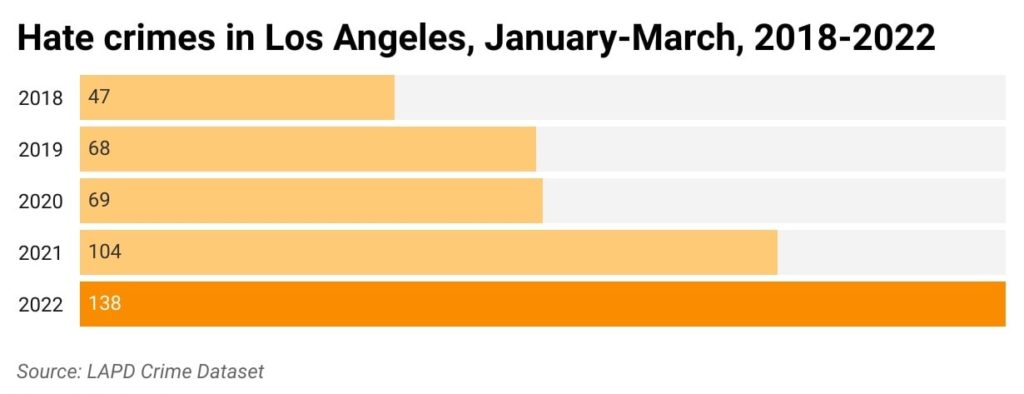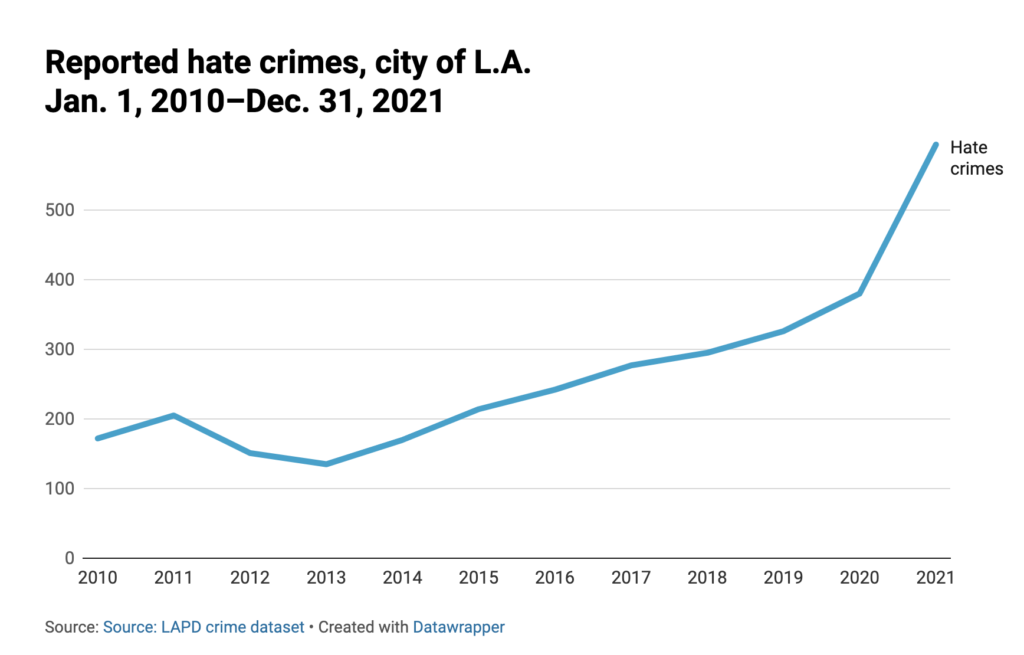Hate crimes in Los Angeles rise in first quarter

In 2021, Los Angeles experienced the pain of recording more hate crimes than any previous year. The 594 reported crimes included a surge in unprovoked attacks on Asian, Black, Latino and Jewish victims, as well as gay men.
The situation is even more troubling in the first part of 2022. From Jan. 1-March 31, there were 138 hate crimes in the city, according to publicly available Los Angeles Police Department data. That is up from 104 in the same period last year.

February alone saw 63 hate crimes. It was the third highest monthly total ever in the city, below the 67 last June and the 66 in April 2021.
“New York, L.A. and Chicago are running ahead of last year, and they’re at a pace where it continues to break records,” said Brian Levin, director of the Center for the Study of Hate and Extremism at California State University, San Bernardino.
A hate crime involves targeting a victim based on race, ethnicity, religion, sexual orientation, disability or gender. In the first quarter, according to the LAPD, Black victims were targeted 41 times, which makes up 30% of all reported hate crimes.
Last month, President Joe Biden signed the Emmett Till Antilynching Act, which makes lynching a federal hate crime, and imposes additional criminal penalties on individuals convicted of hate crimes. But experts argue that the law may not help prevent such crimes.
[Get COVID-19, crime and other stats about where you live with the Crosstown Neighborhood Newsletter]
Michael Lieberman, senior policy counsel at the Southern Poverty Law Center, told NPR this month that educational efforts would be a better tool to deter hate crimes.
“It’s much better to prevent a hate crime than to have a new law that needs to be investigated and enforced,” he said.
Although Black Angelenos were disproportionately the victims of hate crimes during the first quarter, they were not the only community frequently targeted. The LAPD classified 21 hate crimes from Jan. 1-March 31 as anti-Hispanic. Another 19 crimes were identified as anti-Jewish.
Levin said some of the spike could be attributed to controversial topics, such as the debate over critical race theory, that result in political discord.
“Today, we’re seeing hate crimes rise around political and cultural events,” he said.
Assaults continue
Of the 594 reported hate crimes in 2021, 44% were assaults. The trend is continuing. According to the LAPD, 48% of the hate crimes this year were classified as assaults.
Levin said the first quarter statistics are worrying because the increase occurred during a period when hate crimes are usually relatively low. Nicer weather brings more people outdoors, and there is a greater opportunity for conflict, he said.
Indeed, the second quarter of 2021 produced 195 hate crimes, the highest total in any quarter since at least 2010. There were 161 in the third quarter and 136 in the last three months of the year.

Levin added that the coming midterm elections present a chance for more political conflict that devolves into attacks motivated by hate. He said that was the case in 2008, 2016 and 2018, when sharp political division in the nation brought a spike in hate crimes in the latter half of the year.
The ingredients are there, Levin believes, for a record nobody wants to break.
“If everybody keeps up the same pace, we’ll get a 21st century high in 2022,” he said.
How we did it: We examined publicly available LAPD data on reports of hate crimes in the city of Los Angeles. For neighborhood boundaries, we rely on the borders defined by the Los Angeles Times. Learn more about our data here.
LAPD data only reflects crimes that are reported to the department, not how many crimes actually occurred. In making our calculations, we rely on the data the LAPD makes publicly available. The LAPD periodically updates past crime reports with new information, leading the department to recategorize past reports. Revised reports do not always automatically become part of the public database.
Have questions about our data? Write to us at askus@xtown.la.






